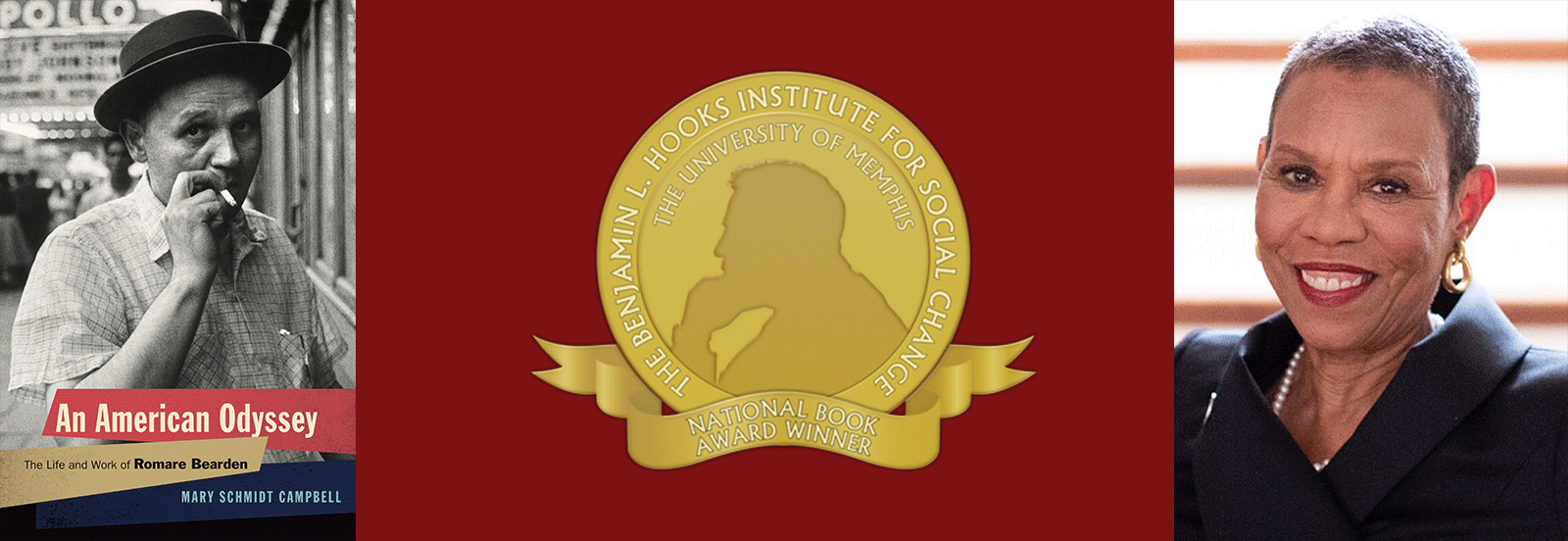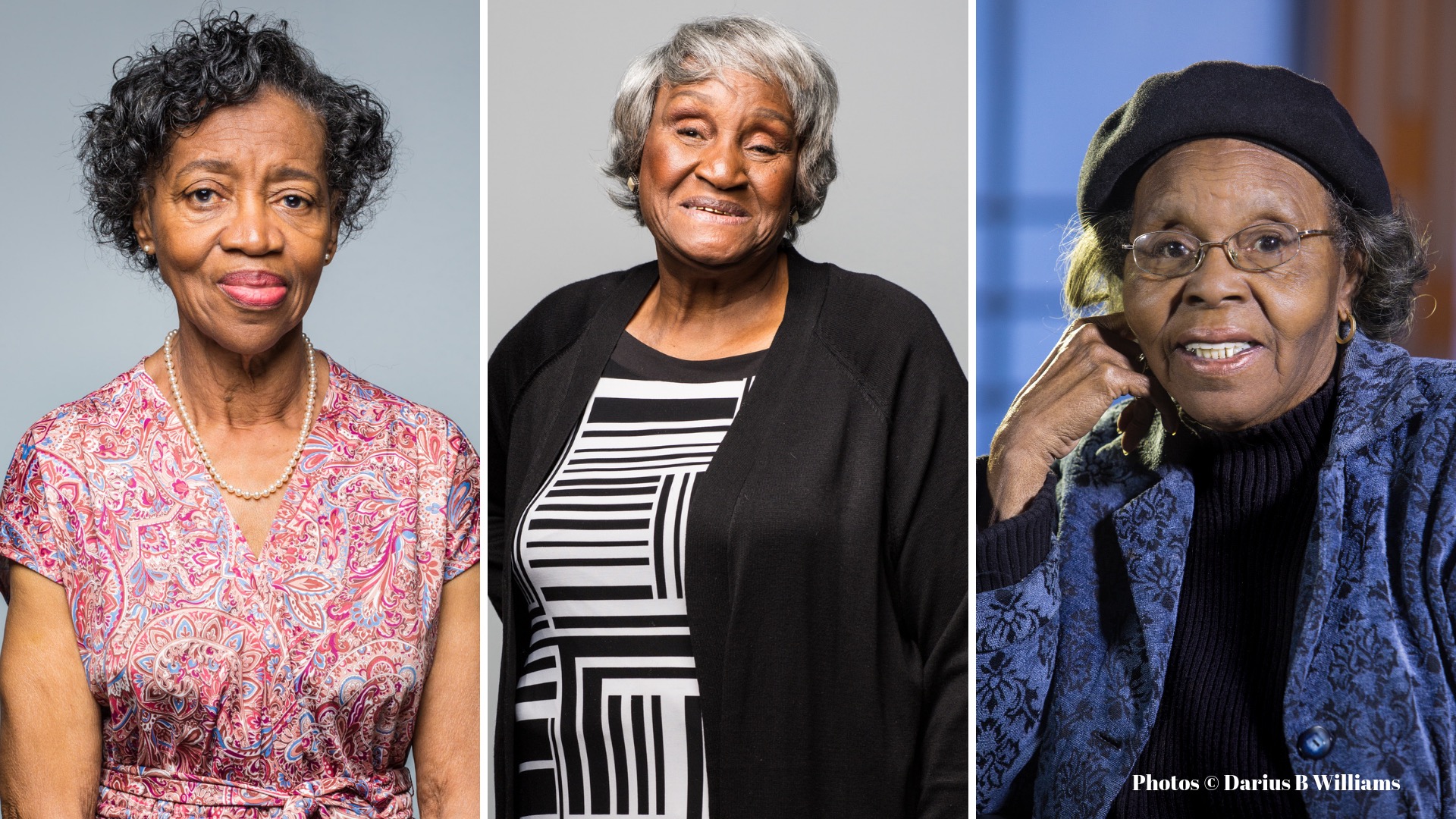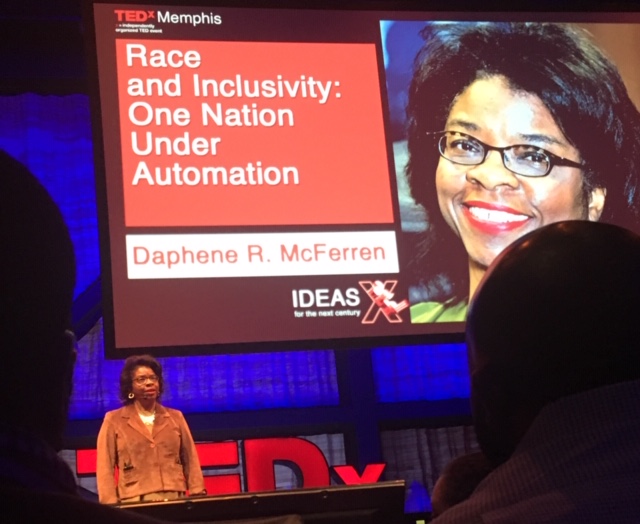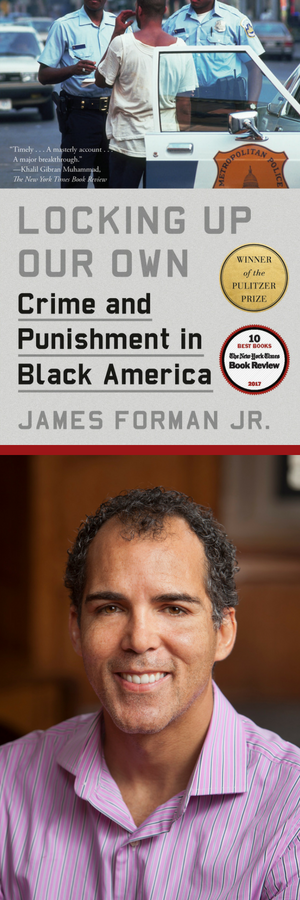2019 Events
Protecting and promoting civil rights and social justice requires vigilance by each of us. The Hooks Institute hopes you will stay engaged with and connected to efforts to promote a just, fair and democratic society. We encourage you to join us at our public events.
Past Events
Thursday, Nov. 7
An American Odyssey: The Life and Work of Romare Bearden Lecture by Dr. Mary Schmidt Campbell, Winner of the Hooks Institute’s National Book Award
Hosted by the National Civil Rights Museum
6 PM Reception | 7 PM Lecture | Hooks Hyde Hall, National Civil Rights Museum | 450 Mulberry St., Memphis, TN 38103

An American Odyssey provides a telling biography of the artist Romare Bearden, whose iconic collages transcended the visual stereotypes of African Americans and conveyed the richness and complexity of African American life in the civil rights era. Campbell is the tenth president of Spelman College.
University of Memphis Sponsors
Presenting Sponosor: African and African American Studies
Supporting Sponsors: Department of Art, Department of Anthropology, Department of History and Marcus Orr Center for the Humanities
Monday, Oct. 28
Land, Economic Mobility and Race | The Tale of Two Nations: One Rich, One Poor | Hooks Institute Open House and Policy Papers Presentation
5:30 PM Reception | 6 PM Lecture | University Center Bluff Room (304)

The Hooks Institute Open House highlighted the programs and initiatives of the Hooks Institute and coincided with the release of the 2019 Hooks Institute Policy Papers, Land, Economic Mobility and Race: The Tale of Two Nations, One Rich, One Poor, which identify and propose solutions to contemporary pressing disparities in Memphis and the nation. They include:
“A Memphis Mirage: How Home Mortgage Alternatives and Increased Equity Firm Ownership Diminish Wealth in Low-Income Communities” by Wade Rathke (founder of the Association of Community Organizations for Reform Now) and Diné Butler examines how large equity firms diminished home wealth in low-income neighborhoods in Memphis and the nation in the years following the Great Recession.
“Workplace Setting and Job Types as Detriments of Health Disparities” by Dr. Shelly
White-Means (University of Tennessee Health Science Center) looks at the impact of
workplace settings and job types on health disparities.
“Economic Challenges Facing Black Men and Boys” by William R. Emmons, Ana H. Kent
and Lowell R. Ricketts (Federal Reserve Bank of St. Louis) identifies solutions to
create, sustain and advance the economic mobility of men and boys of color, who are
more likely to experience downward economic mobility even if born into wealth. The
views expressed do not reflect official positions of the Federal Reserve Bank of St.
Louis or the Federal Reserve System.
Hooks 2019 Open House Powerpoint
June 24 – October 5
If I Had A Camera | Art Shay: Activism, Civil Rights & Justice
Co-organized by The Benjamin L. Hooks Institute for Social Change and the Art Museum of the University of Memphis
June 24— October 5 | Monday— Saturday | 9 AM— 5 PM
Art Museum of the University of Memphis
3750 Norriswood Dr. 142 Communication & Fine Art Building Memphis, TN 38152.
This exhibition featured the photographs of Art Shay (1922-2018) a Chicago-based freelance photographer whose work appeared in Time, Life, Sports Illustrated and many other national publications. During the 1960s, Shay photographed America’s landmark civil rights movements reflecting a struggle that is not history, but continues today.
Tuesday, Oct. 1
Closing Lecture: Civil Rights and Social Unrest Through the Lens of Art Shay by Dr. Erik Gellman, professor, UNC-Chapel Hill
5:30 PM Reception | 6 PM Lecture | Art Museum at the University of Memphis
3750 Norriswood Ave. | 142 Communication and Fine Arts Building

Dr. Erik Gellman is the author of the forthcoming book Troublemakers: Chicago Freedom
Struggles Through the Lens of Art Shay (University of Chicago Press, Dec. 2019). Gellman’s
closing lecture will explore Chicago activism and southern struggles to examine the
interplay between grassroots movements and national political figures. Gellman will
also examine how Shay’s images of social movements reflect the issues of inequality
that continue to permeate America today.
Read the press release for the Gellman lecture.
Left photo: Coretta Scott King leads a silent march of tens of thousands of national mourners from Clayborn Temple to City Hall. April 8, 1968. Center left photo: April 1968. Minerva Johnican grieves the death of Dr. Martin Luther King. Johnican went on to be a pioneer in her own right in Memphis, becoming actively involved in politics, running for mayor of Memphis in 1987. Center right photo: James Baldwin, circa 1961, a novelist and playwright, who was also a formidable civil rights activist who inspired other artists and the public to challenge segregationist laws and practices in America through his writings, public speaking and other forms of activism. Right photo: Robert F. Kennedy on the Campaign trail (1960). All photos: © Art Shay Archives Project, LLC 2019 | All rights reserved.
May 20 – June 27
Exhibit, “Uplift the vote. Everybody should have a voting story. This is theirs. What will be yours?”
Dunbar Carver Museum | 112 Hillcrest Dr., Brownsville, TN
The Benjamin L. Hooks Institute for Social Change at the University of Memphis and the Dunbar Carver Museum invite you to experience "Uplift the Vote: Everyone Should Have a Voting Story," a dual exhibit on the importance of our most basic civil right – the right to vote.
Explore through photographs, documents and reflections, how African Americans' demand for the right to vote in Fayette County, Tenn., in 1959 changed the lives of activists, the community and the nation through the exhibit. Then, prepare yourself for your own civic participation and learn how to register to vote in Tennessee. This exhibit is intended to educate and encourage citizens to exercise the right to vote, hard-won by African Americans and others.
This exhibit is free and open to the public.
About the "Uplift the Vote" Exhibit
Fayette County, Tenn., 1959: The African American community faces Jim Crow laws, intimidation
and violence in their efforts to register to vote. The New York Times described the
civil rights movement in Fayette County as "the longest sustained civil rights protest
in the nation." During that movement, African Americans worked to increase registered
voters and demanded fair elections, integration of public facilities and equal access
to economic opportunities.
May 2
An Evening with Donors and Friends
6–8 PM | University of Memphis Holiday Inn
3700 Central Avenue
Memphis, TN 38152
Watch 2019 Hooks Benefit Video: Ida B. Wells and the Programs of the Hooks Institute
March 21
The Wives of the 1968 Sanitation Workers Strike
Thursday, March 21 | Reception 5:30 p.m. | Program 6 p.m. | University Center River Room (300)

The Hooks Institute hosted this special event to hear first-hand stories of courage and survival from the women of the 1968 Sanitation Workers Strike. The evening featured select excerpts from the national video web series “1300 Men: Memphis Strike '68,” produced by Striking Voices for TheRoot.com, as well as a panel of wives of 1968 strikers, moderated by journalist and Striking Voices founding producer Emily Yellin. Photos © Darius B Williams.
Watch the Women of the Sanitation Workers Strike Panel
February 19
Economic Challenges Facing Black Men and Boys: Beyond the Data to Lived Experience
Tuesday, February 19 | Reception 5:30 PM | Presentation 6 PM | University of Memphis
University Center Theatre
William R. Emmons, PhD ( Economist, Center for Household Financial Stability, Federal
Reserve Bank of St. Louis)
(PDF) Dr. Emmons Powerpont Economic Challenges Facing Black Men and Boys

Dr. Emmons explored the data from the largest study in U.S. history on intergenerational economic challenges facing African American men and boys. How can our communities create and sustain prosperity for men and boys of color? The largest research study in U.S. history on economic mobility of men and boys of color found that they experienced downward economic mobility even if born into wealth. Dr. Emmons will address these findings. A panel discussion of people working in Memphis to create and sustain prosperity for men and boys of color followed.
Panelists
Cedrick Gray, PhD (Director of Education, Shelby County, TN Government);
Elena Delavega, PhD (Associate Professor, UofM School of Social Work);
Gregory Washington, PhD (Associate Professor, UofM School of Social Work);
Darrell C. Ray, PhD (Vice President, UofM Department of Student Affairs)
and Andre E. Johnson, PhD (UofM Department of Communication and Film).
Co-sponsored by these University of Memphis entities: School of Social Work and Division of Student Affairs; and by P3 Financial Group, Inc. (Cordova, TN)
Watch Dr. Emmons Lecture
February 2
TEDx Talk by Daphene McFerren
February, 2, 2019 | Crosstown Concourse. Memphis, Tennessee
TEDx Talk by Daphene McFerren, executive director, Hooks Institute: This TEDx, "Race and Inclusivity: One Nation Under Automation" focuses on the possible impact of automation and artificial intelligence in Memphis which is a majority-minority city. Automation has the potential to help remove economic disparities that impact minorities if minorities are prepared for a 21st century workforce.
Watch Daphene McFerren's TEDx Talk
January 31
 Hooks National Book Award Presentation and Lecture Featuring James Forman, Jr.
Hooks National Book Award Presentation and Lecture Featuring James Forman, Jr.
Thursday, January 31 | Reception 5:30 p.m. | Lecture 6 p.m.
University Center Theatre University of Memphis
Presenting Sponsor: Just City
Locking Up Our Own: Crime and Punishment in Black America by James Forman Jr. was selected as the winner for the 2017 National Book Award. In his book, Forman argues that America’s draconian sentences for drug crimes were created not only by whites but also inadvertently by exasperated African American leaders whose communities were facing an unprecedented drug epidemic starting in the late 1960s. Forman encourages a candid examination of this history to tackle criminal justice reform.
Sponsored by these University of Memphis entities: African and African American Studies, Black Law Students Association, Cecil C. Humphreys School of Law, Department of Anthropology, Department of History, Marcus W. Orr Center for the Humanities and Department of Criminology and Criminal Justice; and by Burke’s Book Store and The Wharton Law Firm.
Watch James Forman, Jr.'s Hooks National Book Award Lecture
January 30–March
Exhibit, “Uplift the vote. Everybody should have a voting story. This is theirs. What will be yours?”
Fayette County Public Schools Central Administration Building,10425 Hwy 76 S. Somerville, TN 38068
February 7 – March 7, Monday through Friday from 12 pm to 4 pm.
The Benjamin L. Hooks Institute for Social Change at the University of Memphis and Fayette County Public Schools, Somerville, Tennessee invite you to experience "Uplift the Vote: Everyone Should Have a Voting Story," a dual exhibit on the importance of our most basic civil right – the right to vote. Explore through photographs, documents and reflections, how African Americans' demand for the right to vote in Fayette County, Tenn., in 1959 changed the lives of activists, the community and the nation through the exhibit. Then, prepare yourself for your own civic participation and learn how to register to vote in Tennessee. This exhibit is intended to educate and encourage citizens to exercise the right to vote, hard-won by African Americans and others.
This exhibit is free and open to the public.
About the "Uplift the Vote" Exhibit
Fayette County, Tenn., 1959: The African American community faces Jim Crow laws, intimidation
and violence in their efforts to register to vote. The New York Times described the
civil rights movement in Fayette County as "the longest sustained civil rights protest
in the nation." During that movement, African Americans worked to increase registered
voters and demanded fair elections, integration of public facilities and equal access
to economic opportunities.
January 21
Civil Rights & Jewish Activism, 2018-19 Jewish Literary & Cultural Arts Series
Monday, January 21, 7 PM | Memphis Jewish Community Center, 6560 Poplar Avenue
